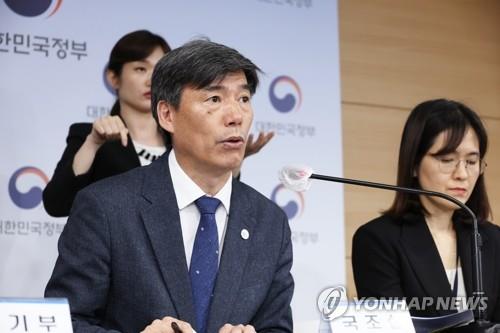Top-notch experts to inspect Japan's crippled Fukushima power plant: gov't

SEOUL, May 12 (Yonhap) -- Top-notch experts will comprise an inspection team South Korea plans to send to Japan's crippled Fukushima nuclear power plant later this month for safety checks ahead of the planned release of radioactive water from the plant, the government said Friday.
The team plans to carry out on-site inspection activities on May 23-24 over the controversial water release, as agreed upon during a summit between President Yoon Suk Yeol and Japanese Prime Minister Fumio Kishida on Sunday.
"The inspection team will be composed of top-notch experts in safety regulations," Park Ku-yeon, the first deputy chief of the Office for Government Policy Coordination, told a press briefing.
Around 20 people, highly unlikely to be civilian experts or those from civic groups, are expected to join the team, according to Park.
Park also stated that the exact size of the inspection team will be decided during working-level consultations between the two countries scheduled for later in the day.
South Koreans have remained concerned possible health hazards from the release of more than 1 million tons of water from the wrecked plant.
The two countries appear to be at odds over the nature of the planned inspection.
While the Seoul government has reiterated that the inspection is aimed at looking into whether Japan's treatment facilities are working properly, Tokyo has struck a different tone.
Earlier this week, Japanese Industry Minister Yasutoshi Nishimura told reporters that the inspection is meant to "help deepen understanding" about the safety of the release, not to evaluate or certify its safety.
"The purpose of inspection activities is to provide an overall review of the safety of the water discharge into the ocean," Park reiterated.
Park said the experts will look into the overall operation of Tokyo's water treatment capacity and discharge facility, as well as its capability to analyze radioactive material.
He noted it marks the first time for South Korea, as an International Atomic Energy Agency (IAEA) member state, to dispatch an independent team to Japan. A separate inspection is currently being carried out by the IAEA.
Park, however, mentioned the difficulty of Seoul's team collecting its own samples, as the IAEA team is currently in charge of collecting and analyzing samples as an official party.
"Of course, when our team arrives at the site, a series of data, questions and facility checks will be conducted to determine safety," Park said.
The plant has stored more than 1.3 million tons of water through a custom purification system known as ALPS, since three reactors melted down after a powerful earthquake struck off the coast in March 2011.
The IAEA, with the participation of one South Korean expert, released five reports, and is scheduled to announce a final report on its multiyear safety review in late June.
(END)





